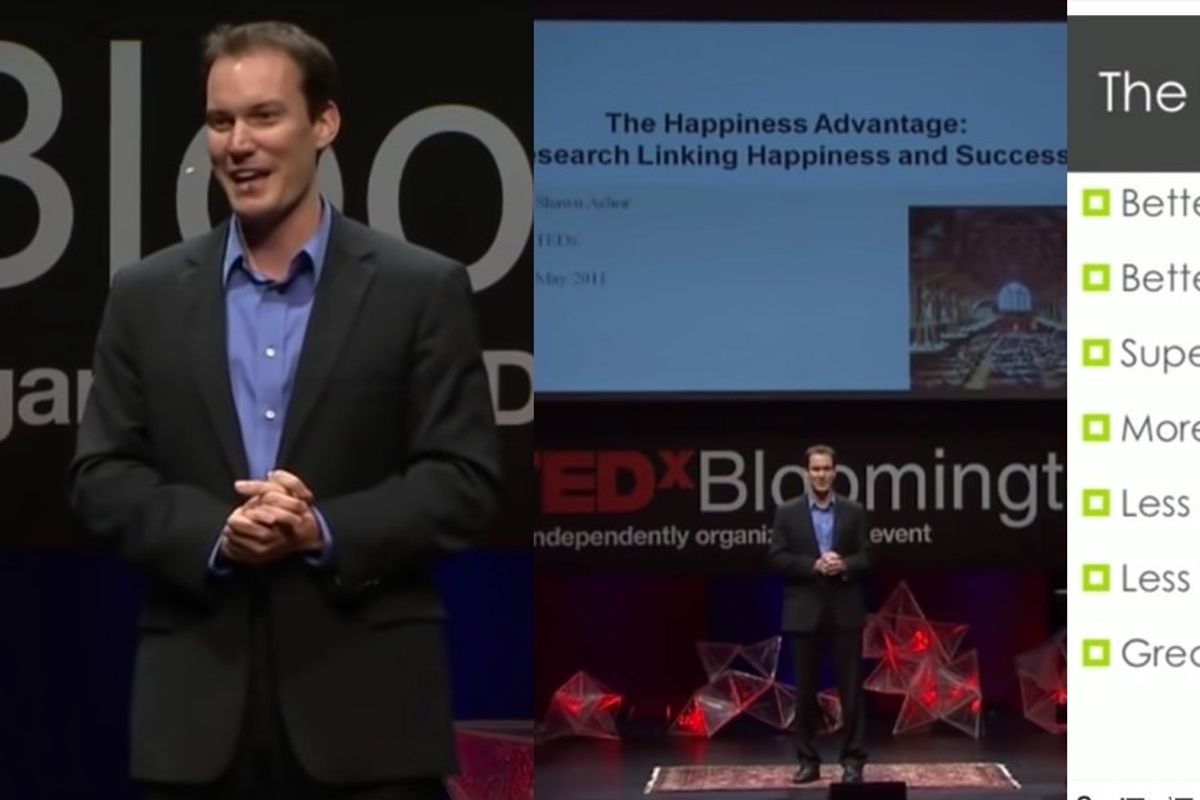Harvard psychologist explains how to achieve happiness—and it's actually simple
It's time to stop giving awfulness the power to bend our lens. Here's how.

Shawn Achor explains "The Happiness Advantage"
Anytime you look at the news, it's about death, destruction, abductions, natural disasters...
That kind of thing can mess us up. It makes the world look scarier than it is. It's like wearing the opposite of rose-colored glasses.
Feel like you've fallen into the Matrix yet?
It's time to stop giving awfulness the power to bend our lens. Here's how.Shawn Achor studied happiness at Harvard.
When he tells people this, they say: "Shawn, why do you waste your time studying happiness at Harvard? Seriously, what does a Harvard student possibly have to be unhappy about?"
But the crazy truth is, Harvard kids are as unhappy as anyone else. What's going on in your life — from health, to money, to relationships, to prestige — predicts only about 10% of your happiness.
So ... if I had a million dollars ... I wouldn't be any happier?
Shawn's work flips our understanding of happiness inside out.
You don't get happy by achieving success. You achieve success by getting happy.
Dopamine, which your brain makes when you're happy, has one important side effect: It makes you smarter. A positive brain is 31% more productive. It's better at sales, faster and more accurate at diagnosing problems.
So how can you up your dopamine?
Take two minutes every day and do one of these things:
- Write down three new things that you're grateful for.
- Journal about one positive experience you've had in the last 24 hours.
- Try meditation, to teach your brain to focus.
- Use the first email you write every day to praise or thank someone you know. Spread the happy.
And it wouldn't hurt to disrupt the endless barrage of bad news by sharing this with your friends, right? Everyone needs a little more happiness.
Remember...
Watch Shawn Achors' Ted Talk in the video below:
This article originally appeared on 04.10.15
- Scientists Discover One Of The Greatest Contributing Factors To Happiness — You'll Thank Me Later ›
- A comic from The Oatmeal illustrates how we're missing the mark on happiness. ›
- 'Star Wars' creator George Lucas explains the secret to happiness ›
- Upworthy's 10 things that made us smile this week - Upworthy ›
- Upworthy's list of 10 things that made us smile this week - Upworthy ›
- This simple visualization exercise has been proven to make people happier - Upworthy ›
- Psychologist with the best job—studying baby laughter—has some seriously wholesome science - Upworthy ›
- 10 happy things from around the internet this week - Upworthy ›
- 10 tidbits of joy and delight from around the internet - Upworthy ›
- Feisty feminist preschooler goes off on a classically Italian rant and it's molto bene. - Upworthy ›
- Upworthy's roundup of delights from around the internet - Upworthy ›

